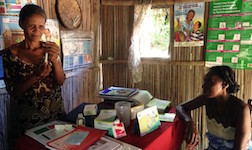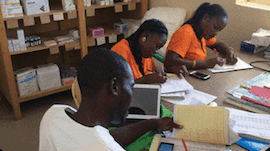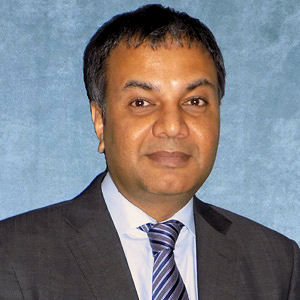WDI researchers from the Healthcare Initiative are set to begin the second year of a project aimed at improving the supply chain and cost recovery systems for essential medicines and health commodities in Madagascar.

The work in Madagascar is one of four projects WDI is performing for Abt Associates as part of the Sustaining Health Outcomes through the Private Sector (SHOPS) Plus project, which is funded by the U.S. Agency for International Development (USAID). WDI was tasked with studying the cost recovery system in Madagascar and finding potential design improvements.
On the island nation off the southeast coast of Africa, the procurement, storage, distribution, and quality assurance of essential medicines and other health products is handled by the central medical store, a non-profit association known as SALAMA. When those drugs and health commodities are supplied by the public sector, a government mechanism called Non-Stop Financing for Medication Supply (in French, FANOME) recovers some logistical and administrative costs.
Cost recovery mechanisms in public health supply chains, such as FANOME, support the principles embodied in the Bamako Initiative. This initiative, adopted in 1987 by African health ministers, is based on the concept that communities should participate directly in the management and funding of essential medicines and health commodities.
These mechanisms are meant to provide a stable source of financing, ensuring a regular supply of essential health products and, ultimately, a self-sustaining system. However, these cost recovery mechanisms sometimes struggle to serve their original purpose.
“We are doing this work while also recognizing that the world has changed since the Bamako Initiative was adopted,” said Steven Harsono, a senior advisor with WDI’s Healthcare Initiative. “Household incomes are rising, the private sector for health products is becoming more formalized, and new health products are being introduced by donor-funded initiatives. Ultimately, we hope that our work will make a modest contribution to equipping the entire health system in Madagascar as it addresses these changing realities.”
While only about 15 percent of total pharmaceutical revenues in Madagascar pass through SALAMA and use FANOME, the two still play an important role in achieving positive public health objectives in the country.
Harsono and Ben Davis, a senior research associate with the healthcare initiative, traveled to Madagascar, and spoke with key government and private sector stakeholders, as well as donors and implementing partners. As Harsono and Davis discovered, FANOME is underperforming due to a number of challenges, including the fact that it must be implemented and regulated in 112 districts and approximately 2,700 government-owned service delivery points.
Still, the greatest challenge lies in its management structure. Multiple agencies manage each of the three levels of FANOME, but no single agency has the full authority or visibility to manage its overall performance. As responsibility for FANOME is dispersed across health system actors and levels, so too is the data that could be used to monitor its proper function.
Armed with this information and feedback gathered through the interviews, the WDI researchers developed concrete recommendations for increasing the sustainability of FANOME and improving its performance.
Among their recommendations for future areas of work are to develop and advance a framework for action-oriented performance management of FANOME. This recommendation is meant to result in a clear method for linking key performance metrics to decision-making within the complex roles and responsibilities structure of FANOME.
Another recommendation of WDI is to conduct a deeper examination of district-level wholesale pharmacies – known as PhaGDis in Madagascar – to explore the factors that contribute to their underperformance. PhaGDis play a critical role in FANOME by linking SALAMA to primary health clinics in each district.
Harsono and Davis will work with country stakeholders to develop a pilot project for addressing PhaGDis underperformance. Following the launch of a pilot, the FANOME performance management framework would be used to monitor pilot efficacy.
“Our work in Madagascar highlights the inherent challenges with implementing the Bamako Initiative vision,” Harsono said. “Empowering local communities and households to financially contribute to quality health products and services requires strong governance and management systems to be in place. Through this project, we are working alongside the Government of Madagascar to improve access with business-minded approaches.”
As part of the SHOPs project, WDI also is examining pharmaceutical supply chains in Senegal, studying pregnancy test kits as part of family planning in five countries, contributing to the design of a challenge fund and learning initiative for innovative health enterprises in India, and contributing to an ecosystem mapping project in Senegal to determine whether challenge funds are an appropriate funding mechanism for health enterprises in the country.
Photo by Colin Gilmartin (Management Sciences for Health)
Outsourcing logistical tasks to the private sector could be a key to drastically improving public health supply chains and increasing access to vital health products in developing countries, according to new research co-authored by WDI Senior Research Fellow Prashant Yadav.

Yadav and his co-authors cite successes in Senegal after the government hired third-party logistics providers to manage orders and handle deliveries of family planning medicines and supplies from district warehouses to local health facilities. Their peer-reviewed article, “Moving Medicine, Moving Minds: Helping Developing Countries Overcome Barriers to Outsourcing Health Commodity Distribution to Boost Supply Chain Performance and Strengthen Health Systems,” was published in the September issue of the journal Global Health: Science and Practice.
Within the first six months of the three-year program, inventory shortages (or “stock-outs”) for items such as contraceptives and implants went from more than 80 percent to less than 2 percent. Additionally, distribution costs declined 36 percent through outsourcing, compared with the paying government health employees to perform essentially the same functions, the research shows.
Supported by Merck for Mothers, The Bill and Melinda Gates Foundation, IntraHealth International, and other partners, the project also implemented an inventory management system and new data tracking that supported mobile warehousing, which made restocking medicines and other health products more responsive to actual consumption. (Unlike a traditional model where inventory is kept in warehouses and trucks are filled based on what clinics order, mobile warehousing uses trucks to bring inventory directly to multiple clinics to replenish their stock.)

Prashant Yadav, WDI Senior Research Fellow
“Well functioning supply chains are critical to ensure availability of medicines and health products,” Yadav said. “Government-run programs play an important role in ensuring equity and efficiency. However, running transport and
distribution in an environment of demand uncertainty and infrastructure constraints requires agile operations, which only the private sector can provide.
“This article highlights the opportunities and challenges that exist in outsourcing select supply chain functions to the private sector,” he said.
The article’s authors caution that third-party outsourcing alone is not a panacea for supply chain challenges, noting that success ultimately depends on a strong government commitment, and clear roles for public and private players. Outsourcing logistical work may also benefit patients by freeing up doctors, nurses, and clinical staff to focus more closely on providing care.
In addition to looking at the many advantages of hiring third-party logistics providers, the authors also examine obstacles that block progress and the best ways to overcome them.
“The success of the (third-party logistics provider) approach in Senegal demonstrates the power of private sector engagement in supply chain reform,” said Priya Agrawal, director of vaccines and women’s health for MSD UK, and a co-author of the article. “It has also contributed to creating jobs and entrepreneurs which is a wonderful unintended consequence. Promoting and improving maternal and reproductive health, and reducing preventable maternal deaths, depends on the ability of women everywhere to get the modern contraceptives they want, where they want them and when they want them. As donors and global health advocates, we must continue to support government leaders, and lend our expertise, as they figure out how to make that happen.”
In addition to Yadav and Agrawal, the other authors are: Iain Barton, of Imperial Health Sciences; Roberto Dal Bianco, of Merck & Co.; and, Dana Hovig and David Sarley, of The Bill and Melinda Gates Foundation.